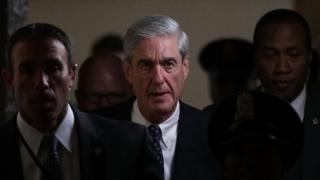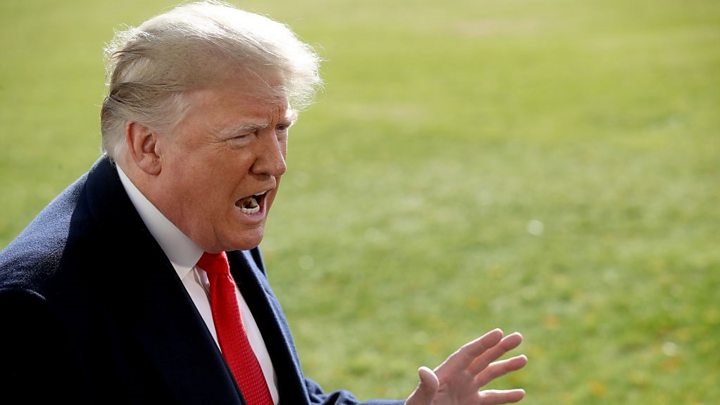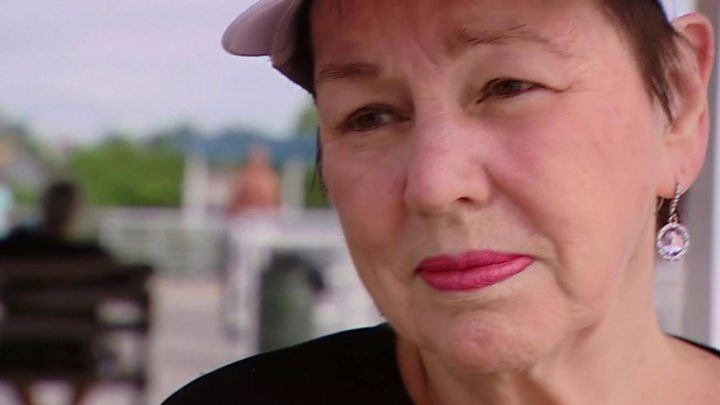Five big things Mueller is looking at
After a lull around the mid-term elections, Robert Mueller’s Russia investigation is accelerating again. But where does it go from here?
Former Trump personal lawyer Michael Cohen’s plea deal was the exclamation point at the end of a week that gave numerous hints and indications of where the special counsel’s office may be focusing its efforts in the days to come.
Here are five potential lines of inquiry Mr Mueller could be pursuing and why.
Trump tower meeting
It’s been more than 16 months since the first public disclosure of the 9 June, 2016, Trump Tower meeting between a Russian team lead by lawyer Natalya Veselnitskaya and Donald Trump Jr, Paul Manafort and Jerrod Kushner – three of the top members of the Trump campaign.
The meeting has continued to loom in the background as either a smoking gun of collusion in plain view or campaign business as usual, depending on who’s doing the talking.
Although Mr Mueller reportedly learned about the meeting at the same time as the rest of America, it’s now clearly a point of interest in the special counsel’s larger investigation into possible co-operation or co-ordination between Russia and the Trump presidential campaign.
According to multiple media outlets, the special counsel’s office asked the president about whether he had advanced knowledge of the meeting in written questions that Mr Trump answered last week.
The president supposedly denied – as he has in public – any prior knowledge of the Trump tower get-together, which was presented to his son as both part of an effort by the Russian government to help the Trump campaign and an opportunity to gain “incriminating information” about Democratic opponent Hillary Clinton.
If the Trump Tower meeting is evidence of the Trump’s campaign team’s interest in gaining information from Russia, the big question becomes what – if anything – happened next.
Ms Veselnitskaya is reported to have ties to senior members of the Russian government. It would not require a significant leap of faith to conclude that the Trump team’s openness to Russian help eventually made it back to those government officials.
Trump Jr responded to word that Russia had dirt on Mrs Clinton with: “If it’s what you say I love it especially later in the summer”. A few months later, according to Mr Mueller, Russians were disseminating damaging information about Mrs Clinton and the Democrats.
Now Mr Mueller is asking questions about the meeting. He’s also had an on-again, off-again co-operation agreement with Mr Manafort, who was in the room for that Trump Tower meeting.
It could be a sign the special counsel knows more than he’s letting on. Or it could mean there’s more he wants to learn. Either way, the Trump Tower meeting is at the centre of it all.
The WikiLeaks connection
One of this week’s big reveals, in the form of a leaked draft plea agreement, was how closely the special counsel team is looking at possible ties between WikiLeaks and those connected with the Trump presidential campaign.
In previous court filings, Mr Mueller identified WikiLeaks as the chosen means by which Russian hackers distributed politically damaging documents and emails it had purloined from Democratic Party and Clinton campaign sources.
Now, per the draft agreement offered to conservative author and conspiracy theorist Jerome Corsi, the special counsel’s office is looking into efforts by long-time Trump associate Roger Stone to reach out to WikiLeaks and its founder, Julian Assange.
The agreement, in which Mr Corsi would have admitted to lying to investigators, included reference to multiple Stone emails, as well as a Corsi reply that told of WikiLeaks document dumps to come.
There have also been multiple news reports of contacts during the 2016 campaign between the president’s eldest son, Donald Trump Jr, and WikiLeaks.
There is still no concrete evidence that Mr Stone, Trump Jr or anyone else with ties to the Trump campaign knew about the hacked Democratic emails before they were publicly released. But the Corsi information shows Mr Mueller is digging in that direction.
The Moscow deal
Mr Trump has insisted, accurately, that there’s no law or rule against exploring foreign business dealings while running for president. It’s not an issue that comes up very frequently, of course, but then-candidate Trump was clear that he wasn’t putting his financial interests on hold while seeking the Republican presidential nomination.
In fact, his claims of business acumen were a central part of his presidential campaign.
Michael Cohen’s plea deal, however, indicates that Mr Mueller and his team are keenly interested in the details of the Trump organisation’s ties to Russia, which the president’s former personal lawyer is now saying stretched well into the heart of the 2016 campaign season.
That Mr Cohen felt compelled to lie to Congress about the extent of these ties – out of what he says was loyalty to Mr Trump and a desire to be consistent with his “political messaging” – could be an indication that there is more to Mr Trump’s Russian business dealings than are currently known by the public.
At the very least it makes clear that Mr Cohen communicated directly with an assistant to Putin spokesman Dmitry Peskov – opening yet another potential line of communication between the Trump team and Russia. In addition a Cohen associate, Felix Sater, was relaying messages from Mr Peskov, who until now had denied any such contacts.
Again, there’s no clear evidence that Mr Trump or those close to him engaged in any misconduct. But it also is clear that as recently as June 2016 Mr Trump’s organisation was seeking to profit from Russian business dealings and, in fact, reportedly considered offering Mr Putin a $50m penthouse in the planned Moscow Trump Tower.
The Cohen revelations aren’t the first indication that Mr Mueller has been “zeroing in” on Mr Trump’s business empire – something the president once said would be a red line the special counsel shouldn’t cross.
Taken with other reports, however – including that US attorneys in Manhattan have given immunity to long-time Trump organisation accountant Allen Weisselberg – it’s clear evidence that the Trump business empire is directly under the microscope.
James Comey’s firing
One area that hasn’t come up in any of Mr Mueller’s court filings to date are allegations that Mr Trump or those close to him in the White House engaged in efforts to obstruct the Russia investigation.
Exhibit A in this case, according to the president’s critics, is his April 2017 firing of James Comey after what Mr Comey said were his efforts to pressure the FBI director to pledge his loyalty and back off an investigation into former National Security Advisor Michael Flynn.
They point to a comment in an interview Mr Trump made shortly after the firing that the move was made with “the Russia thing” in mind and the remark to Russian officials in the Oval Office that removing Mr Comey relieved “great pressure” on him.
Other bits and pieces of evidence include Mr Trump’s very public criticism of former Attorney General Jeff Sessions, whose recusal from the Russia investigation he views as leading to Mr Mueller’s appointment, and the president’s reported effort to fire Mr Mueller last June.
It’s an open question as to whether a president can be charged with obstruction of justice – or if adjudicating such a matter rests solely in the hands of Congress through the impeachment and removal process. Mr Mueller is said to be looking into the matter, however, although a denouement may have to wait until a final, comprehensive report at the conclusion of the investigation.
Russian cyber-warfare
Overlooked in the flurry of revelations of the past few weeks and the “Sturm und Drang” arising from Mr Trump’s repeated criticisms of the special counsel investigation is the fact that Mr Mueller has already laid out extensive details about the nature and extent of Russian efforts to influence the 2016 presidential election.
In a one-two punch of indictments, Mr Mueller detailed Russian use of social media to create false narratives and sow discord in the political process, on-the-ground activities that included information-gathering by Russian operatives and financial support for rallies and protestors during the election season, and the targeted efforts to hack computer systems and emails of Democratic Party and Clinton campaign officials.
The crimes alleged by the special counsel’s office are nothing short of cyber-warfare waged against US institutions at the direction of a foreign government. There’s always the chance that more charges will be filed.
A total of 25 Russian nationals and three Russian organisations have been indicted so far. And given that none of the individuals are in US custody, chances are slim that they will ever face a day in court.
One of the indicted companies, Concord Management and Consult, is contesting the charges in US court, however. At the moment, it is engaged in a legal battle to gain access to information the US government considers “sensitive,” which it lawyers say could aid in their defence.
According to some national security experts, the move could be a Russian effort to bog down the special counsel office or even gather valuable information about the inner workings of Mr Mueller’s investigation.
If this case ever makes it to trial, it could become the source of some unexpected drama that lasts well beyond the main fireworks of the Russia probe.
Source: Read Full Article





